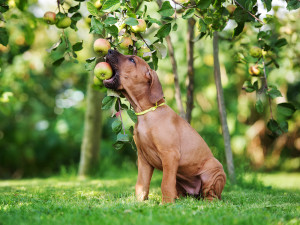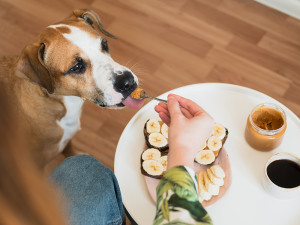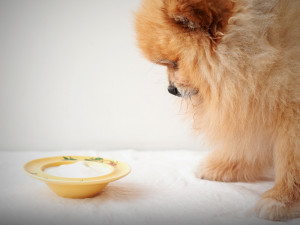Can Dogs Eat Sweet Potatoes?
Add it to the list of healthy human superfoods pups can eat, too.

Share Article
We humans love our sweet potato fries, but can our dogs eat sweet potatoes, too? Thankfully for everyone at home – especially the four-legged food thieves we live with – the answer is yes. These root vegetables are loaded with nutrients, such as the carotenoids, vitamin C and vitamin A, in addition to antioxidants and phytochemicals. They are high in pyridoxine, potassium, fibre and magnesium. They are also good sources of copper, iron and manganese – all essential minerals for dogs that perform myriad cell functions, from transporting oxygen to assisting in the assembly of proteins. All this, plus they’re low in fat (also music to our human ears).
What’s in a name?
While sweet potatoes are indeed called ‘potatoes,’ they aren’t related to white potatoes (insert head exploding emoji here). And they do come in many colours besides the more familiar orange. The Japanese sweet potato has a purple skin and yellow flesh, and its flavour is actually sweeter – something that dogs love – than the more popular orange varieties. It also is particularly rich in phytonutrients.
How to add sweet potatoes to your dog’s diet
One of the most popular ways to give your dog sweet potatoes is as dehydrated chews. They make a great alternative to rawhide chews – and unlike rawhide, sweet potato chews do not have a reputation for causing digestive blockages and choking. So, they are a lot safer and definitely more nutritious.
Do not give dogs raw sweet potatoes, though; they should always be cooked. Steam and mash them, then add a little to your dog’s normal meal. Steaming or boiling actually maintains more of their nutrients than roasting or baking does. Because they are rich in fibre, introduce sweet potatoes slowly.
Cooked sweet potatoes are also tasty in a Kong – freeze it so it takes longer for your pup to finish it.
Note: while caution was taken to give safe recommendations and accurate instructions in this article, it is impossible to predict an individual dog’s reaction to any food or ingredient. Readers should consult their vets and use personal judgement when applying this information to their own dogs’ diets.

Claudia Kawczynska
Claudia Kawczynska was co-founder and editor-in-chief of The Bark for 20 years. She also edited the best-selling anthology Dog Is My Co-Pilot.
Related articles
![Ridgeback puppy eating an apple from a low-hanging tree]()
Can Dogs Eat Apples?
Yep – this fibre-filled fruit is a healthy treat for your dog
![View over the shoulder of a women eating peanut butter and bananas and feeding some of the peanut butter to her dog on a spoon]()
Peanut Butter Is the Best Snack. Can Your Dog Have It?
Peanut butter is widely considered one of dogs’ favourite snacks (and a great bribery tool) – but how much is too much?
![A person giving a banana to a dog.]()
10 Fruits and Vegetables That Your Dog Can Feast On
Indulge your dog (safely) with these delicious and healthy snacks
![Pomeranian stands in front of a yellow bowl of homemade probiotic yogurt]()
Are Probiotics Actually Something Your Dog Needs?
Time for a (literal) gut check from four experts




